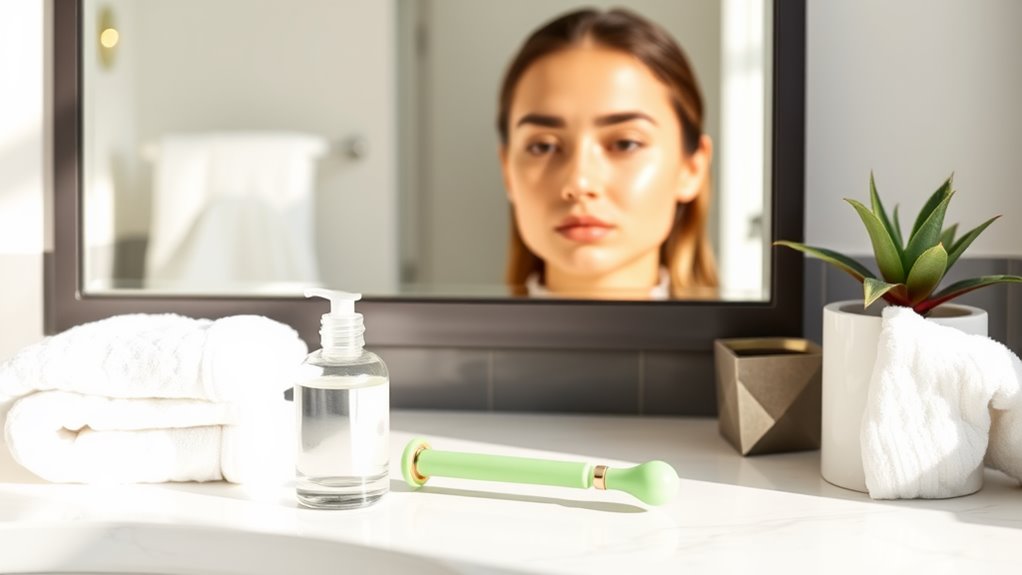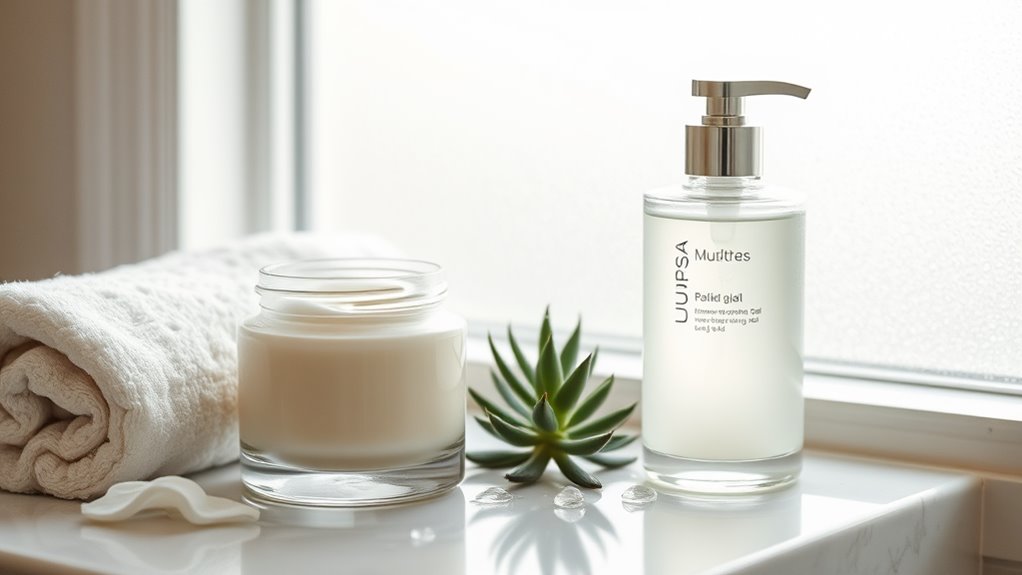This Morning Routine Keeps My Face Clear Every Day
To keep your face clear every day, start with a gentle morning cleanse to remove impurities. Exfoliate 2-3 times a week for radiant skin. Make sure to hydrate with a good moisturizer and consider using serums packed with nourishing ingredients. Don’t forget sun protection—apply a broad-spectrum sunscreen daily. Finally, stick to your routine for best results. Keep following these steps, and you’ll discover more tips for glowing skin along the way.
Key Takeaways
- Start each morning by cleansing your skin with a gentle cleanser to remove overnight impurities.
- Exfoliate 2-3 times a week to enhance skin texture and radiance.
- Keep skin moisturized daily with products containing hyaluronic acid or glycerin for optimal hydration.
- Apply broad-spectrum sunscreen with at least SPF 30 every morning to protect against UV damage.
- Maintain a consistent skincare routine, adjusting as needed for your skin type to achieve clear skin.
Cleansing: The Essential First Step
When you wake up, the first thing you should do is cleanse your skin. Your morning face deserves a fresh start, free from the impurities that accumulate overnight.
Use a gentle cleanser tailored to your skin type; this sets the stage for the rest of your routine. Apply it in circular motions, focusing on areas prone to oil and dirt buildup. Rinse thoroughly with lukewarm water to guarantee no residue lingers.
This crucial step not only removes dead skin cells but also preps your skin to absorb the products you’ll apply next. Remember, using the right cleanser is key to achieving optimal cleansing results. Embrace this moment—it’s your daily ritual to achieve clarity and radiance.
Exfoliating for Radiant Skin
Although cleansing lays the foundation for your morning routine, exfoliating takes your skincare to the next level by removing dead skin cells and promoting cell turnover.
Incorporating exfoliation two to three times a week allows your skin to breathe and glow. Choose a gentle chemical exfoliant with alpha or beta hydroxy acids for precise results, or opt for a physical scrub if you prefer. Additionally, consider following your exfoliation with a homemade face mask for glowing skin, as these can provide extra nourishment and hydration.
Always apply exfoliants on damp skin and follow with a light touch, ensuring you don’t irritate your complexion. After exfoliating, you’ll notice an enhanced texture and radiance, making your skin look revitalized.
Hydration: Keeping Your Skin Moisturized
To achieve clear skin, keeping your skin moisturized is essential, as hydration helps maintain its barrier function and overall health. Incorporate these strategies into your routine for ideal results:
| Product Type | Recommended Ingredients |
|---|---|
| Moisturizer | Hyaluronic acid, Glycerin |
| Serum | Vitamin E, Niacinamide |
| Face Oil | Jojoba oil, Rosehip oil |
| Hydrating Mist | Aloe vera, Green tea extract |
Use a lightweight moisturizer in the morning and a richer cream at night. Don’t forget to drink plenty of water throughout the day. By focusing on hydration, you’ll enhance your skin’s resilience, elasticity, and overall glow, setting the foundation for a radiant complexion. Additionally, incorporating natural oils into your routine can further support your skin’s hydration and youthfulness.
Sun Protection: Shielding Against UV Damage
Protecting your skin from UV damage is crucial for maintaining its clarity and health, especially since sun exposure can lead to premature aging, dark spots, and even skin cancer. Inadequate sun protection is the number one skincare mistake that accelerates premature aging, making it essential to prioritize proper UV defense.
To achieve ideal protection, choose a broad-spectrum sunscreen with at least SPF 30. Apply it generously to all exposed areas, even on cloudy days, as UV rays can penetrate through clouds.
Don’t forget your ears, neck, and the back of your hands, as these areas often get overlooked. Reapply every two hours, or more frequently if you’re swimming or sweating.
Incorporating sun protection into your routine not only safeguards your skin today but also guarantees long-term well-being. Make it a non-negotiable part of your daily regimen for the best results.
Consistency: The Key to Long-Term Results
When it comes to achieving clear skin, consistency truly makes all the difference. You need to commit to your skincare routine daily, treating it as an essential part of your life rather than a chore.
Skipping days or changing products too frequently can disrupt your skin’s balance and hinder progress. Stick to a regimen that suits your skin type, and don’t be afraid to adjust it as your skin evolves.
Track your progress to identify what works best, and remember that results take time. By establishing this disciplined approach, you’re not only nurturing your skin but also building a habit that reinforces your commitment to self-care. A comprehensive exploration of dermatologist-approved routines can further enhance your understanding of effective skincare.
Ultimately, consistency is your greatest ally in the pursuit of long-lasting, clear skin.
Frequently Asked Questions
How Often Should I Change My Pillowcase for Clearer Skin?
You should change your pillowcase every three to four days to keep your skin clear. Regularly washing it removes dirt, oils, and bacteria, helping prevent breakouts and promoting a healthier complexion for you.
Does Diet Really Affect My Skin’S Clarity?
Yes, your diet greatly impacts your skin’s clarity. Consuming nutrient-rich foods, staying hydrated, and avoiding excessive sugar can enhance your complexion. You’ll notice improvements as you make healthier choices and eliminate potential triggers.
Can Stress Lead to Breakouts and How Can I Manage It?
Absolutely, stress can trigger breakouts by increasing cortisol levels, which boosts oil production. To manage it, practice mindfulness, exercise regularly, and prioritize sleep. Incorporating relaxation techniques will help you maintain clearer skin and overall well-being.
What Ingredients Should I Avoid in Skincare Products?
When choosing skincare products, avoid harsh ingredients like parabens, sulfates, and artificial fragrances. These can irritate your skin and trigger breakouts. Instead, look for gentle, natural alternatives that nourish and support your complexion effectively.
How Do Hormonal Changes Impact My Skin Health?
Hormonal changes can trigger oil production, leading to breakouts or dryness. You might notice increased sensitivity or uneven texture. Staying attuned to these fluctuations helps you adjust your skincare routine for ideal skin health.





